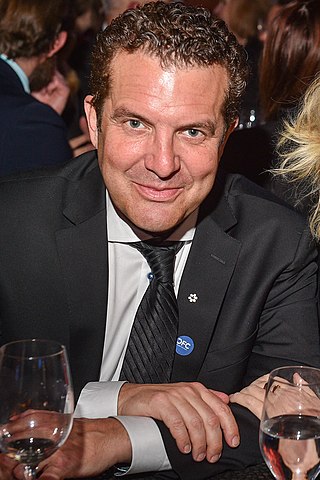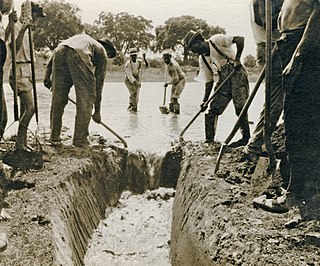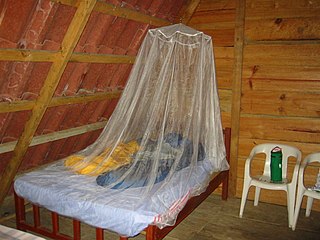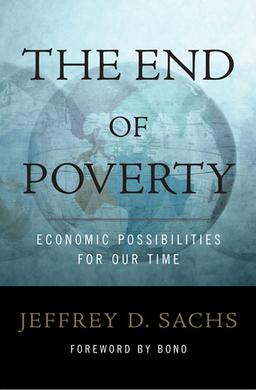
Dichlorodiphenyltrichloroethane, commonly known as DDT, is a colorless, tasteless, and almost odorless crystalline chemical compound, an organochloride. Originally developed as an insecticide, it became infamous for its environmental impacts. DDT was first synthesized in 1874 by the Austrian chemist Othmar Zeidler. DDT's insecticidal action was discovered by the Swiss chemist Paul Hermann Müller in 1939. DDT was used in the second half of World War II to limit the spread of the insect-borne diseases malaria and typhus among civilians and troops. Müller was awarded the Nobel Prize in Physiology or Medicine in 1948 "for his discovery of the high efficiency of DDT as a contact poison against several arthropods". The WHO's anti-malaria campaign of the 1950s and 1960s relied heavily on DDT and the results were promising, though there was a resurgence in developing countries afterwards.

Malaria is a mosquito-borne infectious disease that affects humans and other vertebrates. Human malaria causes symptoms that typically include fever, fatigue, vomiting, and headaches. In severe cases, it can cause jaundice, seizures, coma, or death. Symptoms usually begin 10 to 15 days after being bitten by an infected Anopheles mosquito. If not properly treated, people may have recurrences of the disease months later. In those who have recently survived an infection, reinfection usually causes milder symptoms. This partial resistance disappears over months to years if the person has no continuing exposure to malaria.

The United Nations Foundation is a charitable organization headquartered in Washington, DC, that supports the United Nations and its activities. It was established in 1998 with a $1 billion gift to the United Nations by philanthropist Ted Turner, who believed the UN was crucial for addressing the world's problems. Originally primarily a grantmaker, the UN Foundation has evolved into a strategic partner to the UN, mobilizing support to advance the Sustainable Development Goals (SDGs), and help the UN address issues such as climate change, global health, gender equality, human rights, data and technology, peace, and humanitarian responses. The UN Foundation's main work occurs through building public-private partnerships, communities, initiatives, campaigns, and alliances to broaden support for the UN and solve global problems. The UN Foundation has helped build awareness and advocate for action on, among others, antimicrobial resistance, regional action on climate change, local implementation of the SDGs, as well as global campaigns such as Nothing But Nets against malaria, the Measles & Rubella Initiative, the Clean Cooking Alliance, Girl Up, Shot@Life, and the Digital Impact Alliance, among others. In March 2020, the UN Foundation was also a key founder of the COVID-19 Solidarity Response Fund on behalf of the World Health Organization (WHO), helping to raise over $200 million USD within the first six weeks to support the global response to the COVID-19 pandemic.

Richard Vincent "Rick" Mercer is a Canadian comedian, television personality, political satirist, and author. He is best known for his work on the CBC Television comedy shows This Hour Has 22 Minutes and Rick Mercer Report. He is the author of four books based on content from the shows and a memoir, Talking to Canadians, published on November 2, 2021. Mercer has received more than 25 Gemini Awards for his work on television.

Jeffrey David Sachs is an American economist, academic, public policy analyst, and former director of The Earth Institute at Columbia University, where he holds the title of University Professor. He is known for his work on sustainable development, economic development, and the fight to end poverty.

Belinda Caroline Stronach is a Canadian businesswoman and philanthropist, and was a Member of Parliament (MP) in the House of Commons of Canada from 2004 to 2008. Originally elected as a Conservative, she later crossed the floor to join the Liberals. From May 17, 2005, to February 6, 2006, Stronach was the Minister of Human Resources and Skills Development and Minister responsible for Democratic Renewal in the government of Paul Martin. After leaving politics, she served as the executive vice-chairman of Magna International, Canada's largest automotive parts manufacturer, until December 31, 2010.

Frank Stronach is an Austrian and Canadian businessman and politician.
Tropical diseases are diseases that are prevalent in or unique to tropical and subtropical regions. The diseases are less prevalent in temperate climates, due in part to the occurrence of a cold season, which controls the insect population by forcing hibernation. However, many were present in northern Europe and northern America in the 17th and 18th centuries before modern understanding of disease causation. The initial impetus for tropical medicine was to protect the health of colonial settlers, notably in India under the British Raj. Insects such as mosquitoes and flies are by far the most common disease carrier, or vector. These insects may carry a parasite, bacterium or virus that is infectious to humans and animals. Most often disease is transmitted by an insect bite, which causes transmission of the infectious agent through subcutaneous blood exchange. Vaccines are not available for most of the diseases listed here, and many do not have cures.

Vector control is any method to limit or eradicate the mammals, birds, insects or other arthropods which transmit disease pathogens. The most frequent type of vector control is mosquito control using a variety of strategies. Several of the "neglected tropical diseases" are spread by such vectors.

A mosquito net is a type of meshed curtain that is circumferentially draped over a bed or a sleeping area, to offer the sleeper barrier protection against bites and stings from mosquitos, flies, and other pest insects, and thus against the diseases they may carry. Examples of such preventable insect-borne diseases include malaria, dengue fever, yellow fever, zika virus, Chagas disease and various forms of encephalitis, including the West Nile virus.

The End of Poverty: Economic Possibilities for Our Time (ISBN 1-59420-045-9) is a 2005 book by American economist Jeffrey Sachs. It was a New York Times bestseller.
The Millennium Villages Project (MVP) was a demonstration project of the Earth Institute at Columbia University, the United Nations Development Programme, and Millennium Promise aimed at proving that its integrated approach to rural development can be used to achieve the Millennium Development Goals—eight globally endorsed targets that address the problems of poverty, health, gender equality, and disease—by 2015.

Nothing But Nets is a global, grassroots campaign of the United Nations Foundation to raise awareness and funding to fight malaria, a leading cause of death among children in Africa.

The history of malaria extends from its prehistoric origin as a zoonotic disease in the primates of Africa through to the 21st century. A widespread and potentially lethal human infectious disease, at its peak malaria infested every continent except Antarctica. Its prevention and treatment have been targeted in science and medicine for hundreds of years. Since the discovery of the Plasmodium parasites which cause it, research attention has focused on their biology as well as that of the mosquitoes which transmit the parasites.

World Malaria Day (WMD) is an international observance commemorated every year on 25 April and recognizes global efforts to control malaria. Globally, 3.3 billion people in 106 countries are at risk of malaria. In 2012, malaria caused an estimated 627,000 deaths, mostly among African children. Asia, Latin America, and to a lesser extent the Middle East and parts of Europe are also affected.

Guinea faces a number of ongoing health challenges.

Liberia is one of the poorest countries in the world. Civil wars have killed around 250,000 people and displaced many more. The wars ended in 2003 but destroyed most of the country's healthcare facilities. Recovery precedes proceeds, but the majority of the population still lives below the international poverty line. Life expectancy in Liberia is much lower than the world average. Communicable diseases are widespread, including tuberculosis, diarrhea, malaria, HIV, and Dengue. Female genital mutilation is widely practiced. Nearly a quarter of children under the age of five are malnourished and few people have access to adequate sanitation facilities. In 2009, government expenditure on health care per-capita was US$22, accounting for 10.6% of totaled GDP. In 2008, Liberia had only one doctor and 27 nurses per 100,000 people. It was ill-equipped to handle the outbreak of Ebola in 2014 and 2015.
The Johns Hopkins Center for Communication Programs (CCP) was founded over 30 years ago by Phyllis Tilson Piotrow as a part the Johns Hopkins Bloomberg School of Public Health's department of Health, Behavior, and Society and is located in Baltimore, Maryland, United States.
Sauri is an eleven-village conglomerate located in the former Nyanza Province of western Kenya and was the first and largest of the fourteen Millennium Village Project (MVP) demonstration sites that ran from 2005 to 2015 in sub-Saharan Africa. The aim of the MVP in Sauri was to halve extreme poverty of villagers living below US$1 between 2000 and 2015. The overarching goal was achieving sustainable development through progress in public health, education, infrastructure, and agricultural productivity.

Quartan fever is one of the four types of malaria which can be contracted by humans.

















